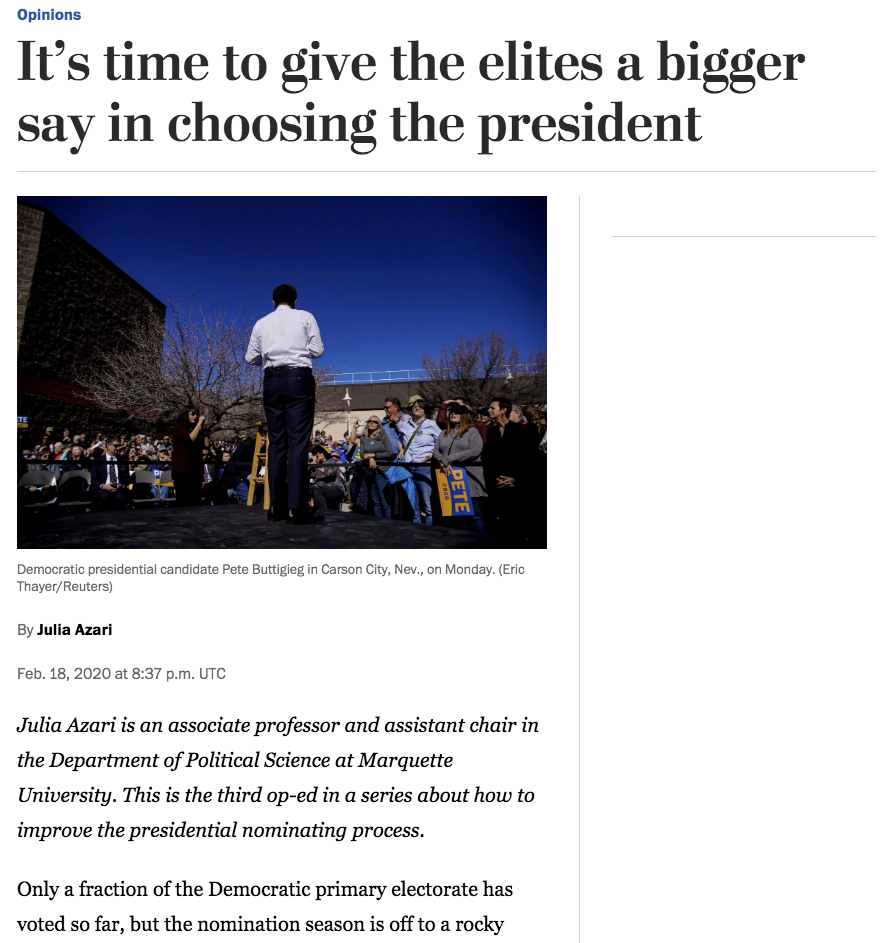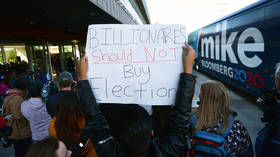Oligarchy dies in darkness? WaPo wants a bigger role for 'elites' in picking the president, & doesn't even try to hide why

"Elites" should get "a bigger say in choosing the president," a Washington Post oped has declared, describing a system where regular voters just tell elites their pick and go home to let their betters work it all out.
The popular vote has been declared an anachronistic inconvenience in a WaPo oped by Marquette University professor Julia Azari that bemoans the "rocky start" to the Democratic primaries. Vermont Senator Bernie Sanders is leading the popular vote in the first two states, but this doesn't match the delegate count, which unsurprisingly favors establishment favorite Pete Buttigieg. It's best, then — according to Azari — to throw out the whole system.

Starting from the relatively uncontroversial principle that the current primary system is overly complex and sometimes coughs up unviable candidates, Azari takes a hard oligarchic turn. She calls for further disenfranchising ordinary voters by making their "vote" merely a suggestion given to an elected "intermediate representative," who then "bargains" with the other representatives without being bound by the wishes of the voters who put them in place.
If that sounds like the nominating system already in place at the party conventions, you're not wrong. Azari, it seems, merely wants to extend the elites' ability to pull the ripcord on populist drift down a step to make even the state primaries safe for her preferred, predetermined form of "democracy." And if that sounds unfair — surely, she can't be suggesting party elites rig the primaries — the whole point, in her mind, is to remove "uncertainty" from the nominating process, then allow a kayfabe (controlled, pro-wrestling-style theatre) version in the general contest:
Democracy thrives on uncertainty — outcomes that are not known at the beginning of the process. But uncertainty doesn't help parties strategize for the general election.
But Azari would be hard-pressed to find any rank-and-file voter who would agree that the problem with American elections is "uncertainty" — or that the solution to the real problem is to give less power to the people. It's not, after all, like the "elites" are underrepresented in circles of power. No one who has made it to the general election in the last 20 years has done so without an Ivy League pedigree, the ultimate elite signifier, and the journalists who write about them (and sell them to the voters) often move in the same elite social circles. A for-show "preference primary" in which the hoi polloi merely "inform elites about voter preferences," which those elites are free to disregard, would forever seal off the process to genuine democracy, enshrining the "smoke-filled rooms" Democratic National Committee lawyers defended when they were sued over rigging the 2016 primary into procedure for the foreseeable future. At a time when exclusion mechanisms like superdelegates are less popular than ever, to try to shove this "reform" down voters' throats is almost guaranteed to backfire.
This is, in a way, the point — both of the headline and of WaPo in general: to gaslight the reader into believing there is a national consensus behind the odious ideas it publishes, which are in reality the views of a moneyed oligarchy that feels only disdain for not only "flyover country," but for the working-class denizens of the cities its members inhabit who keep the lights on and the shelves stocked. If the reader believes "superdelegates for primaries" are a done deal, they're less likely to take to the streets and start breaking things.
Also on rt.com ‘Oligarch v oligarch’ in 2020? Democrats could rob Bernie & nominate Bloomberg in Wall Street win-win – Lee CampIf the response on social media was any indication, Azari's "fake the consensus" model isn't doing so hot these days — though it did inspire a bizarre consensus of its own between pro-Trump conservatives, #Resistance liberals, and progressives:
Democracy dies in darkness unless darkness is what the elites need to rig an election in which case maybe democracy isn't all that great anyway. pic.twitter.com/GgRcDPI7Gd
— Sean Davis (@seanmdav) February 19, 2020
“Democracy Dies in Darkness,” whispers Jeff Bezos to Michael Bloomberg, Rupert Murdoch, Julian Sinclair, and Donald Trump in a dark, smoke filled room. “Suckers.”
— Eugene Gu, MD (@eugenegu) February 19, 2020
One of the more mask off headlines I’ve seen in awhile pic.twitter.com/CwlDXikoDG
— Ken Klippenstein (@kenklippenstein) February 19, 2020
It's still over a month until April Fool's Day, and Azari at no point breaks character, so the reader can only assume the piece is meant in full seriousness.
Think your friends would be interested? Share this story!
The statements, views and opinions expressed in this column are solely those of the author and do not necessarily represent those of RT.














